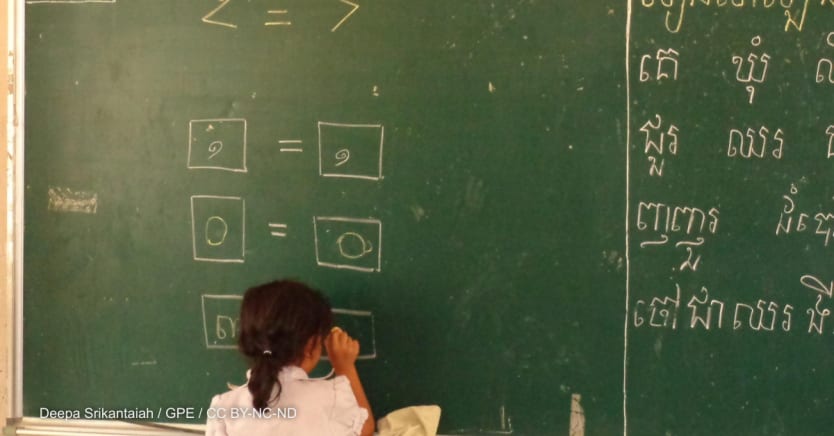
People’s assumptions about how girls and boys do in school need updating. A constant stream of campaigns on girls’ education and girls being furthest behind has drowned out the fact that girls’ learning outcomes are shooting upward. The data has been showing girls overtaking boys in middle- and high-income countries for a while now. And data from learning assessments carried out just before the COVID-19 pandemic shows that girls are often doing better than boys in low-income countries too.
The latest Global Education Monitoring report findings in “Deepening the Debate on Those Still Left Behind” analyzed data from 120 countries in primary and secondary education to offer a truly global picture. It finds that girls are better than boys in learning in general — across all country income groups and all academic levels.
Contrary to widely held views that boys perform better than girls in math, new analysis shows that this is also not the case. Boys tend to be better in math in the early grades, but by the time they reach the end of primary school, this advantage tapers off.
Gender equality in education is influenced by societal gendered expectations. We must question beliefs that continue to assign gender-specific roles and expectations.
—The gender gap in learning has closed even in lower-income countries. In some countries, girls have long overtaken boys. For example, by grade eight, girls do better in mathematics by three points in Cambodia, by 1.7 points in Congo, and by 1.4 points in the Philippines. While we don’t have data yet from low-income countries in science, we do know that in middle- and high-income countries, girls in secondary school are scoring significantly higher in this subject too.
Girls’ learning progress could bring us closer to gender equality in societies. But we can see more subtle findings showing challenges remain.
Girls are catching up in mathematics in primary and secondary education on average, but boys are still far more likely to be overrepresented among those at the top of the class in all countries. This finding is a nod toward the gender biases still in society about further education in science, technology, engineering, and mathematics, or STEM, fields being a boy’s place, not a girl’s.
Globally, the percentage of females studying engineering or ICT is below 25% in over two-thirds of countries and very few women pursue careers in information and communication technologies. Despite their advantage, in other words, girls are still less likely to opt for scientific careers and invest in mathematics and science to their full capacity; stereotypes of what they should do after school hold them back.
Rabia, a young girl in Pakistan, exemplifies this. She grew up in a small town and fought biases and norms all the way to university to study engineering. She was told from a young age that a career in engineering is not for women. She persisted, and today, she is the only female engineer in a water technology company in Lahore. She also teaches chemical engineering and tries to break down the barriers that prevent girls from studying STEM by being a role model for other female students.
Women like Rabia are important in society. Without equal female representation in all sectors, myths and preconceptions that hold back girls and women will keep perpetuating. Their voices and ideas will not be heard, and important innovations will be developed only by men. We can’t let society and culture steer girls away from these important fields.
And while we can celebrate the fact that girls are progressing in many corners of the world, this should not stop us from continuing to fight for those still pushing for education access in some lower-income countries. Data from the UNESCO Institute for Statistics show us that the rates of learning in some countries in sub-Saharan Africa remain extremely low. In Chad, the Democratic Republic of Congo, and Zambia, only 2% of girls can do basic math by the end of primary school.
After two decades of calling for more gender equality in education, the world has come a long way, but it’s important we now — as the report suggests — deepen the debate even further. First, we need a better picture of the situation, especially from the lowest-income countries with more data that will help develop better policies to support all children to learn.
Second, it is time for the conversation to move on and to include boys. For all the countries where girls’ education must be the top priority, there are others where boys’ needs should be on the agenda in policy debates.
Finally, our discourse and focus on access, completion, and learning rates need to extend to societal norms influencing the possibility of progress on gender equality. Gender equality in education is influenced by societal gendered expectations.
We must question beliefs that continue to assign gender-specific roles and expectations. One way to do this is for all teachers, schools, and career counselors to have training that will prevent negative gender stereotypes to have an indirect effect on teaching and students’ subject choices.
If more women are supported to break down gender stereotypes — like Rabia — we can have a more equal society.








